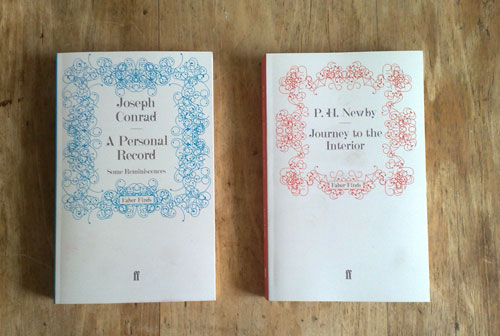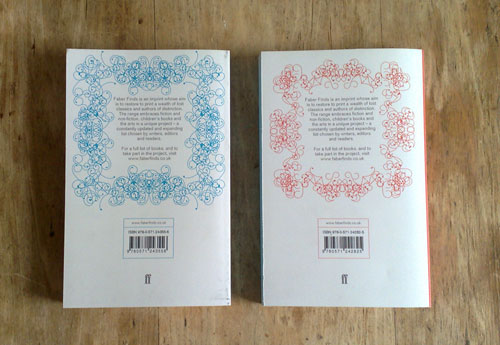Faber Finds is the new print-on-demand (POD) offering from Faber. It’s a classics list made up of old Faber titles, with the intention (I believe) of extending to a wider range of ‘forgotten classics’.
Slowly, the larger publishers are coming round to the view that much smaller publishers (such as Salt) have had for a long time: POD offers great benefits for publishers, mostly through doing away with the old and horrifically wasteful system of printing thousands of copies up front without any real idea of whether they’ll sell or not. This increasingly outmoded system is the root cause of much of the mid- and backlist malaise currently affecting the industry.
Publishers have traditionally looked down on POD as the domain of vanity publishers and cranks, largely due to the unacceptably poor quality of the final product. This disdain is no longer justified, and POD lists are starting to appear. I’ll declare my interest now: I’ve been working on a POD project for some time, the fruits of which will be available soon.
However, I don’t think many of these publishers have really got it – including Faber Finds, and the recently announced PFD list – and I’ll explain why.
Publishers have been at pains for some time to stress that what matters in their books, after the quality of the writing, is the production and presentation. The book as a premium object, well-made, lasting, and respectable. This is why they’ve stayed away from POD, and, to a large extent, ebooks, for so long. Leaving aside the fact that many, many current paperbacks produced by ‘traditional’ methods don’t really stand up to this, it has been the statement.
So what are Faber’s aims with the Finds list? They claim to have have spent a long time looking at the various POD offerings from printers, and they’ve gone with Antony Rowe over the US-owned Lightning Source (these two are the only real possibilities at the current time). At a glance, the books look good (they do on the website too), but both my editions arrived in substantially less-than-pristine condition. Both are heavily marked with dirt and even a large thumbprint – more obviously than these photographs show – a recurring problem with white-covered books, and surely one Faber could have anticipated. Far less forgivably, the Newby edition is badly cut, with jagged edges.
Dirt aside, I like the front covers, I really do, but there is little more to appreciate in these editions. They have generic back covers trumpeting not the book but the Faber Finds list. They have no introductions, nor any signs of individual craft or attention. Worst of all, they are both – and I expect the whole list is – photostat editions: straight reprints of previous editions without regard to consistent typography or the book format they are printed in. The result is acres of white space as an old edition is shoehorned into the new. POD printing costs by the page, so it’s no wonder they have to sell lots of copies before they make any money.
All of this seems to fatally undermine the publishers’ insistence on the premium object. Both of these books may technically have been ‘out of print’, but the Conrad is easily available in a much nicer edition from Amazon, and Abe Books has plenty of old editions of the Newby, all for far less than the £10 – £15 asking price of Faber Finds. So with no added extras, who is expected to buy them?
POD does offer a huge opportunity for publishers, but these current offerings from Faber and PFD appear to have more to do with hanging on to the rights to these works than any genuine desire to see them prosper. The rights to books that are out of print for a particular length of time revert to the author, and while the new technologies have muddied this issue somewhat, the lack of care and attention given to these reprints smacks of opportunism rather than any genuine benefit to readers or the authors’ estates.
We’re all for publishers using new technologies to create new markets for old as well as new books, and applaud any move in this direction, but these shoddy POD titles, coupled with the recent spate of lazily-designed, ill-conceived and just plain broken websites, suggest that publishers have a long way to go before they understand the workings of the new market.



At the very least, the fact that (bigger name) publishers are pushing into this domain will hopefully bring about competition, and thereby a reduction in cost and increase in quality.
We’re currently mapping out a reprint of one of our older titles and it would be wonderful to have a viable POD option. However, with production being an even stronger component for a small press like us, there’s simply nowhere to turn. That said, I know we’d be interested in a POD hybrid solution—i.e., pushing a run of 1,000 with POD for the several hundred sales that may trickle in beyond that.
And indeed—white cover on an (I assume) uncoated paperback stock like that is asking for trouble.
Comment by Craig — July 18, 2008 @ 5:36 pm
Thank you for these insightful thoughts. Might I add that in addition to upholding production values the print-on-demand
press faces considerable resistance from traditional media, which have by and large chosen to regard POD as a vanity endeavor. I’m sure that if print-on-demand presses lavished marketing money on these media their resistence would give way. But I suspect the blogosphere offers a more promising vehicle for promoting POD work. Would you agree, I wonder?
Sincerely,
Djelloul Marbrook
Comment by djelloul marbrook — July 18, 2008 @ 6:46 pm
Craig – your books are beautiful, and I agree POD isn’t there yet for art-quality titles. I look forward to competition putting pressure on POD providers to improve their services, which at the moment are not easy to access.
Djelloul – I think I say most of that, and I hope that the blogosphere is not the only venue: my point is that POD is now in a position to seriously compete in every area.
Comment by James Bridle — July 18, 2008 @ 7:00 pm
James,
Great post. I agree with your thinking on most of this!
Especially on Faber, I was thinking of buying a rake of books from FaberFinds but held off until I head some feedback and I’m pretty sure I won’t now.
I cannot fathom the decision not to reset internals! Seems obtuse!
Eoin
Comment by Eoin Purcell — July 18, 2008 @ 11:50 pm
Whilst it’s not a huge innovation, Faber Finds is an ambitious move (as many as 1,000 books in a short space of time apparently), and it’ll be interesting to see how everyone else, ie the big guns, react. It should, hopefully, lead to some interesting new publishing models. I thought they were resetting the text (according to the press release at least), and those white covers will have to be addressed.
Interesting post, but your last paragraph lets you down! When assessing other recent projects (and the new Canongate site is at least an improvement on the previous two incarnations), you might have mentioned that the new Granta site doesn’t exactly set pulses racing. If publishers start spending resources they don’t have on dross like Bkkeepr will they then be successfully understanding the workings of the new market?
Comment by Kenny — July 19, 2008 @ 7:22 pm
Kenny – I’m afraid I disagree with you on Canongate’s site: it’s difficult to navigate, contains less actual book information (that I can find) than the previous one, and is illegible and broken in many places. Likewise, the Granta site is not ‘exciting’, but it is fit for purpose, and has attracted plaudits from around the world. But each to their own.
I’m sorry you consider bkkeepr dross, but one of the many points of it was that publishers don’t have to spend huge resources on projects like this: it cost me nothing to build. The new market, as the three sites I pointed to show, has nothing to do with spending vast sums of money on expensive agencies.
Comment by James Bridle — July 21, 2008 @ 11:46 am
[…] Intéressant billet de James Brindle qui revient sur le nouveau business de l’impression à la demande (POD), notamment avec le lancement récent de Faber, Faber Finds. Faber Finds a pour ambition de proposer des classiques oubliés en POD, dans une mise en page qui semblait plutôt attractive. Mais voilà, constate Brindle, la réalisation laisse à désirer : mal coupées, traces d’encres et de doigts, et surtout, pas la moindre attention aux lecteurs : pas d’introduction, pas de mise en page, … Sans compter que les deux éditions que Brindle a acheté sont disponibles par ailleurs chez d’autres éditeurs, non POD. […]
Pingback by La Feuille » Archive du blog » Quand les éditeurs prendront-ils l’impression à la demande au sérieux ? — July 21, 2008 @ 6:09 pm
“I’ve been working on a POD project for some time, the fruits of which will be available soon.”
I’m impatient to know a little more, James !… Especially after this post who shows that POD does not yet appear to be technically mature.
Comment by Hubert Guillaud — July 21, 2008 @ 6:12 pm
I agree with your assessment of the Faber Finds product. I ordered Rankin’s “Dead Man’s Chest” and it arrived with dirt on the back and a bit bent on the spine. In this case though, unless the original edition was badly typeset, I think the text has undergone OCR and then *not* been proofread, as their are numerous blatant typesetting errors that disrupt your reading of the book and generally let the product down.
I was sad to find this was the case because I was pleased with the concept and thought the approach to covers was fun, and the list is certainly enticing. But having paid £16+ (after delivery charges) for a sub-par product, I’m unlikely to buy again.
I can only imagine that the folks at Faber are aware of these issues and for some (good or otherwise) reason had to make decisions that put Faber Finds where it is in terms of product quality. I’d be interested to discuss that decisions making process with them…
Comment by James — July 23, 2008 @ 2:28 pm
… oh and, I actually rather like Faber’s new site, not least because it puts readers at the top of the nav, and gives you the means to browse the catalogue based on your own interest… one man’s fish is another man’s poisson, and all that.
Comment by James — July 23, 2008 @ 2:31 pm
Some valid comments re. Faber Finds. The marked covers is a problem, but our production folks are on the case.
James@digitalist was right that the text has been re-set. Rather than reflowing the text, the plan was to stick to the same lines and line-endings as seen in the original texts.
Faber Finds is a very ambitious project – there should be at least 300 titles each year (it doubles Faber’s list). In an ideal world there’d be more people and more time to work on the books. There’s obviously room for improvement but if you believe it’s just another cynical fleecing exercise you should spend a few minutes in the company of the series editor …
And as for the ‘lazily designed’ Faber site, we didn’t feel lazy when we were slaving away at it. It’s not the finished article yet in terms of content and integrating bits of technology further down the line. Surely it boils down to the question ‘why would anyone visit a publisher’s website?’. There’s a number of different answers to that question and a few different audiences to cater for – not all of whom are Twitter-literate or on last.fm (now there’s a backlash …)
Comment by Matthew — July 24, 2008 @ 11:15 am
Hi Matthew – thanks for the response.
What is the reasoning behind resetting a text to be exactly the same as previous additions? Surely a large part of resetting is to make it fit the page better?
I’ve just been to the site again, and here’s what happened:
I added this book to my basket, and then clicked ‘Checkout’ in the sidebar. I was then told there was nothing in my basket.
Am I supposed to sign in before I order? There is no assistance so it’s hard to know. I then signed in, and the basket forgot my order, so had to re-enter it.
Oh no, it’s still in there on the book page, but not on the basket page.
I previously found that removing stuff from my basket actually resulted in a server error, but since I now can’t seem to even add anything to my basket, whether logged in or not, and tried lots of different books, I gave up.
Added to this the complete lack of styling on a number of pages, and the fact that faberfinds runs in an iframe, I’m sticking to calling it lazily-designed. Sorry, it’s not meant personally, but what do you expect when I can’t use it?
Comment by James Bridle — July 24, 2008 @ 12:24 pm
Hey James, thanks for such an interesting read and the pointers to other people in this field. Whilst I can’t and won’t comment on the production quality/issues with the actual books, I can contribute a bit insight into the creation of the generative cover designs, though:
http://postspectacular.com/process/20080711_faberfindslaunch
Comment by Karsten Schmidt — July 24, 2008 @ 1:34 pm
Hey Karsten – that’s awesome, thanks so much. Excellent work.
I’m afraid I feel that I have to add, without naming names, that a Faber source has privately admitted to me that the problems I detail above with the site are known to them, which I think justifies my other comments. I’m certainly not saying it’s easy.
Comment by James Bridle — July 24, 2008 @ 1:41 pm
[…] Damn right. They will use any goddammed trick they can devise to keep their fangs in a writer’s neck until not only have they sucked out all the blood, they’ve also sucked out the appendix! […]
Pingback by Mike Cane — July 30, 2008 @ 11:28 pm
[…] an interesting post at Booktwo.org about Faber & Faber (‘Faber Finds’) getting into POD. […]
Pingback by Adrian Graham — August 12, 2008 @ 6:01 am